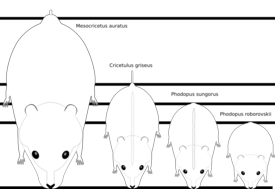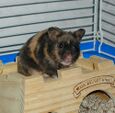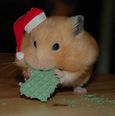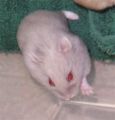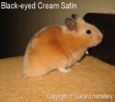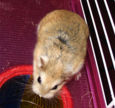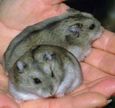Difference between revisions of "Hamster Breeds - WikiNormals"
Jump to navigation
Jump to search
Fiorecastro (talk | contribs) |
|||
| (28 intermediate revisions by 4 users not shown) | |||
| Line 1: | Line 1: | ||
| − | + | ||
| − | + | [[Image:Hamster_sizes.png|thumb|right|275px|'''Hamster Species Relative Sizes''' <br> 1.''Mesocricetus auratus'' - Syrian Hamster <br> 2.''Cricetulus griseus'' - Chinese Hamster <br> 3.''Phodopus sungorus'' - Russian Dwarf <br> 4.''Phodopus roborovskii'' - Roborovskii <br> <br> WikiCommons]] | |
| − | + | ==Introduction== | |
| − | + | *There are two common types of Hamster kept as pets, Syrians and Dwarfs. The examples below do not represent all breeds of Hamster but are those that are most commonly encountered in the UK. | |
| − | + | *Other breed and showing information can also be found at the UK "National Hamster Council" at http://www.hamsters-uk.org/. | |
| − | |||
| − | |||
| − | |||
| − | |||
| − | [[Image:Hamster_sizes.png|thumb|right|275px|'''Hamster Species Relative Sizes''' <br> 1.''Mesocricetus auratus'' - Syrian Hamster <br> 2.''Cricetulus griseus'' - Chinese Hamster <br> 3.''Phodopus sungorus'' - Russian Dwarf <br> 4.''Phodopus roborovskii'' - Roborovskii]] | ||
| − | == | ||
| − | *There are two common types of Hamster kept as pets, Syrians and Dwarfs | ||
| − | |||
==Syrians== | ==Syrians== | ||
| − | |||
===Colour Varieties=== | ===Colour Varieties=== | ||
| − | + | <gallery widths="115px" perrow="5"> | |
| − | <gallery widths="115px" perrow=" | ||
Image:Black_hamster.jpg|'''Black''' <br> freedigitalphotos.net | Image:Black_hamster.jpg|'''Black''' <br> freedigitalphotos.net | ||
Image:Chocolate_hamster.jpg|'''Chocolate''' <br> flickr.com | Image:Chocolate_hamster.jpg|'''Chocolate''' <br> flickr.com | ||
| Line 34: | Line 24: | ||
Image:Lilac_hamster1.JPG|'''Lilac''' <br> freewebs.com | Image:Lilac_hamster1.JPG|'''Lilac''' <br> freewebs.com | ||
Image:Roan_hamster.jpg|'''Roan''' <br> ''(Comes in various shades)'' <br> hamsters.co.uk | Image:Roan_hamster.jpg|'''Roan''' <br> ''(Comes in various shades)'' <br> hamsters.co.uk | ||
| + | </gallery> | ||
| − | |||
| − | |||
===Coat Varietes=== | ===Coat Varietes=== | ||
| − | + | <gallery widths="115px" perrow="5"> | |
| − | <gallery widths="115px" perrow=" | ||
Image:Longhaired_hamster.jpg|'''Longhaired''' <br> ''(Various body colours)'' <br> flickr.com | Image:Longhaired_hamster.jpg|'''Longhaired''' <br> ''(Various body colours)'' <br> flickr.com | ||
Image:Rex_hamster.jpg|'''Rex''' <br> ''(Various body colours)'' <br> hamstercentral.com | Image:Rex_hamster.jpg|'''Rex''' <br> ''(Various body colours)'' <br> hamstercentral.com | ||
Image:Longhaired_satin_hamster.jpg|'''Longhaired Satin''' <br> ''(Various body colours)'' <br> mokkie.com | Image:Longhaired_satin_hamster.jpg|'''Longhaired Satin''' <br> ''(Various body colours)'' <br> mokkie.com | ||
Image:Shorthaired_satin_hamster.jpg|'''Shorthaired Satin''' <br> ''(Various body colours)'' <br> freewebs.com | Image:Shorthaired_satin_hamster.jpg|'''Shorthaired Satin''' <br> ''(Various body colours)'' <br> freewebs.com | ||
| + | </gallery> | ||
| − | |||
| − | |||
===Coat Patterns=== | ===Coat Patterns=== | ||
| − | + | <gallery widths="115px" perrow="5"> | |
| − | <gallery widths="115px" perrow=" | ||
Image:Banded_hamster.PNG|'''Banded''' <br> ''(Various Colours)'' <br> WikiCommons | Image:Banded_hamster.PNG|'''Banded''' <br> ''(Various Colours)'' <br> WikiCommons | ||
Image:Dominant_spot.jpg|'''Dominant Spot''' <br> ''(Various Colours)'' <br> geocities.com | Image:Dominant_spot.jpg|'''Dominant Spot''' <br> ''(Various Colours)'' <br> geocities.com | ||
| + | </gallery> | ||
| − | + | ==Dwarf== | |
| − | |||
| − | ==Dwarf== | ||
| − | |||
===Russian Campbell (''Phodopus sungorus'')=== | ===Russian Campbell (''Phodopus sungorus'')=== | ||
*Russian Campbell hamsters are the most common form of Dwarf hamster and are noted for shorter tails and furry feet. Males are slightly larger than females. Most Campbells have the same appearence as the picture far left below, although modern breeding does give other colours such as the Blue Fawn. Therefore many of the standard colour examples above are also seen in Campbells hamsters. Coat types usually are either short haired or satin. | *Russian Campbell hamsters are the most common form of Dwarf hamster and are noted for shorter tails and furry feet. Males are slightly larger than females. Most Campbells have the same appearence as the picture far left below, although modern breeding does give other colours such as the Blue Fawn. Therefore many of the standard colour examples above are also seen in Campbells hamsters. Coat types usually are either short haired or satin. | ||
| − | |||
*Coat types usually are either short haired or satin. | *Coat types usually are either short haired or satin. | ||
| − | <gallery widths="115px" perrow=" | + | <gallery widths="115px" perrow="5"> |
Image:Campbells_hamster2.jpg|'''Campbells''' <br> WikiCommons | Image:Campbells_hamster2.jpg|'''Campbells''' <br> WikiCommons | ||
Image:Campbell_hamster.jpg|'''Campbell''' <br> WikiCommons | Image:Campbell_hamster.jpg|'''Campbell''' <br> WikiCommons | ||
Image:Campbell_hamster_blue_fawn.jpg|'''Campbell''' <br> ''Blue Fawn'' <br> WikiCommons | Image:Campbell_hamster_blue_fawn.jpg|'''Campbell''' <br> ''Blue Fawn'' <br> WikiCommons | ||
Image:Campbells_hamster_diagram.png|'''Standard Campbell Markings''' <br> WikiCommons | Image:Campbells_hamster_diagram.png|'''Standard Campbell Markings''' <br> WikiCommons | ||
| + | </gallery> | ||
| + | |||
| + | ===Chinese Hamster ''(Cricetulus griseus)''=== | ||
| + | *Chinese hamsters have long, thin bodies and relatively long tails. They are very territorial, with females being more aggressive than males. Therefore they should usually be housed individually. | ||
| + | *The two examples below show the different colours usually associated with Chinese Hamsters. On the left is an example of a Dominant Spot and on the right is an example of Standard colouring. | ||
| + | <gallery widths="115px" perrow="5"> | ||
| + | Image:Chinese_Hamster.jpg|'''Chinese Hamster''' <br> WikiCommons | ||
| + | Image:Chinese_hamster2.jpg|'''Chinese Hamster''' <br> WikiCommons | ||
| + | </gallery> | ||
| + | |||
| + | ===Roborovskii Hamster ''(Phodopus roborovskii)''=== | ||
| + | *Adult Roborovskii hamsters usually grow to approximately 5cm in length and are the smallest common type of hamster. The standard colour is a sandy brown coat on their head and back and a white colour on its belly. They also have white "eyebrows". | ||
| + | <gallery widths="115px" perrow="5"> | ||
| + | Image:Roborovskii.jpg|'''Roborovskii''' <br> WikiCommons | ||
| + | Image:Roborovskii2.jpg|'''Roborovskii''' <br> WikiCommons | ||
| + | Image:Roborovskii3.JPG|'''Roborovskii''' <br> WikiCommons | ||
| + | </gallery> | ||
| + | ==Other Varieties== | ||
| + | ===Winter White Russian Dwarf Hamster ''(Phodopus Sungorus)''=== | ||
| + | *Currently not common in the UK but becoming more popular. These hamsters are also known as "Siberian Hamsters". Although they are very similar to Campbell hamsters, Winter White Russians are called "Winter White" because during winter they have a white coat. In summer their coat returns to that very similar to Campbell hamsters. | ||
| + | *It should be noted that if the hamster is not subjected to changes in length of day i.e. by living indoors, the coat change may only be minor. | ||
| + | <gallery widths="115px" perrow="5"> | ||
| + | Image:Normalww.jpg|'''Winter White''' <br> ''(Summer Coat)'' <br> hamsterhideout.com | ||
| + | Image:Normalw.jpg|'''Winter White''' <br> ''(Winter Coat Central)'' <br> hamsterhideout.com | ||
</gallery> | </gallery> | ||
| − | |||
| − | |||
| − | |||
| − | + | {{toplink | |
| − | < | + | |linkpage =WikiNormals |
| − | + | |linktext =WikiNormals | |
| + | |||
| + | |pagetype =WikiNormals | ||
| + | |sublink1= Small Rodent Section - WikiNormals | ||
| + | |subtext1= Small Rodent Section | ||
| + | }} | ||
| + | |||
| + | ==Webinars== | ||
| + | <rss max="10" highlight="none">https://www.thewebinarvet.com/internal-medicine/webinars/feed</rss> | ||
Latest revision as of 14:03, 9 January 2023
Introduction
- There are two common types of Hamster kept as pets, Syrians and Dwarfs. The examples below do not represent all breeds of Hamster but are those that are most commonly encountered in the UK.
- Other breed and showing information can also be found at the UK "National Hamster Council" at http://www.hamsters-uk.org/.
Syrians
Colour Varieties
Coat Varietes
Coat Patterns
Dwarf
Russian Campbell (Phodopus sungorus)
- Russian Campbell hamsters are the most common form of Dwarf hamster and are noted for shorter tails and furry feet. Males are slightly larger than females. Most Campbells have the same appearence as the picture far left below, although modern breeding does give other colours such as the Blue Fawn. Therefore many of the standard colour examples above are also seen in Campbells hamsters. Coat types usually are either short haired or satin.
- Coat types usually are either short haired or satin.
Chinese Hamster (Cricetulus griseus)
- Chinese hamsters have long, thin bodies and relatively long tails. They are very territorial, with females being more aggressive than males. Therefore they should usually be housed individually.
- The two examples below show the different colours usually associated with Chinese Hamsters. On the left is an example of a Dominant Spot and on the right is an example of Standard colouring.
Roborovskii Hamster (Phodopus roborovskii)
- Adult Roborovskii hamsters usually grow to approximately 5cm in length and are the smallest common type of hamster. The standard colour is a sandy brown coat on their head and back and a white colour on its belly. They also have white "eyebrows".
Other Varieties
Winter White Russian Dwarf Hamster (Phodopus Sungorus)
- Currently not common in the UK but becoming more popular. These hamsters are also known as "Siberian Hamsters". Although they are very similar to Campbell hamsters, Winter White Russians are called "Winter White" because during winter they have a white coat. In summer their coat returns to that very similar to Campbell hamsters.
- It should be noted that if the hamster is not subjected to changes in length of day i.e. by living indoors, the coat change may only be minor.
|
|
Webinars
Failed to load RSS feed from https://www.thewebinarvet.com/internal-medicine/webinars/feed: Error parsing XML for RSS
